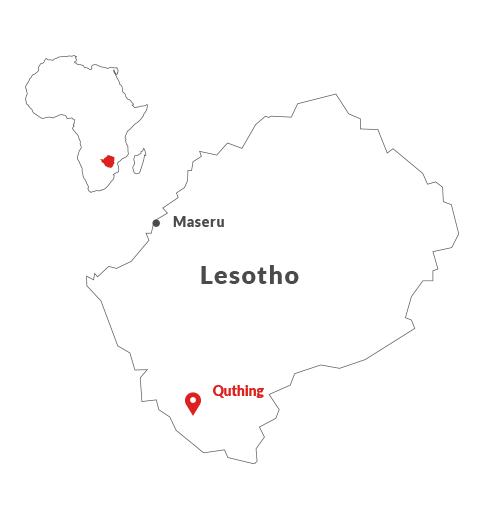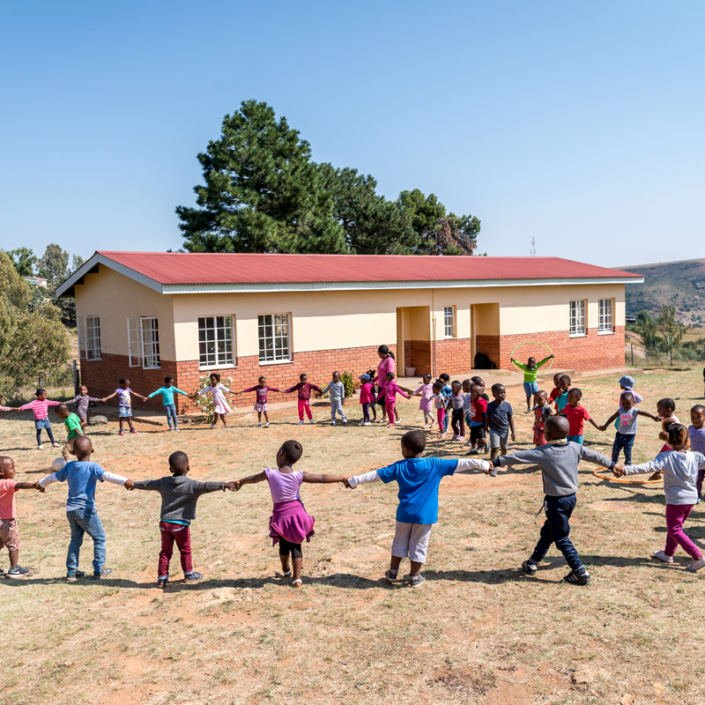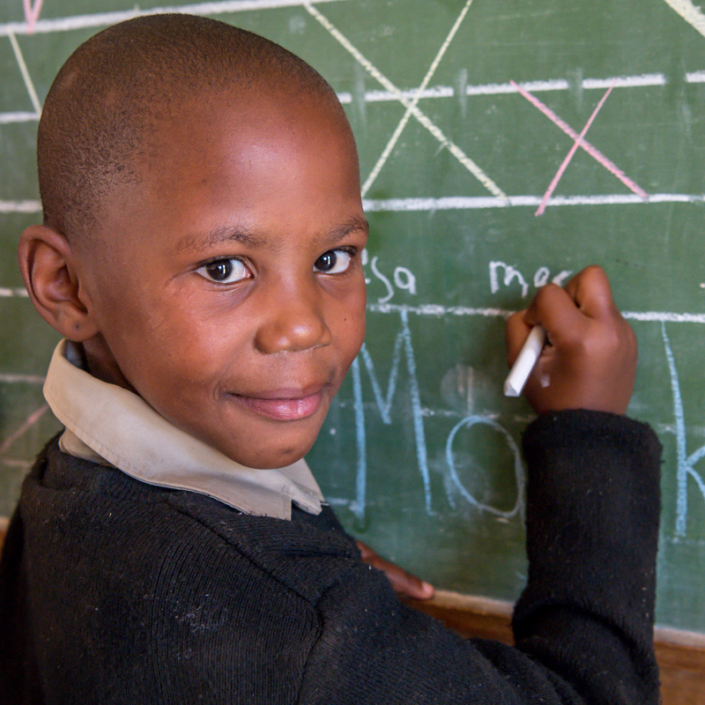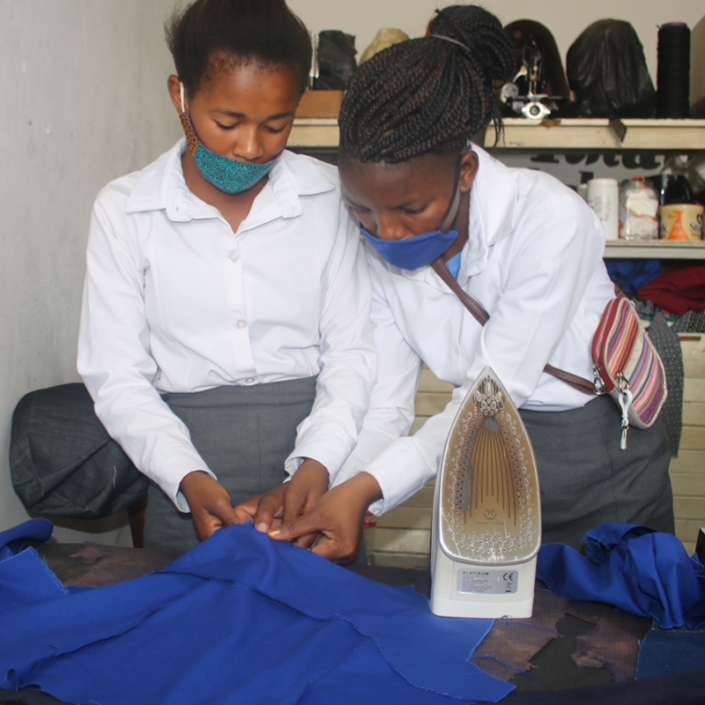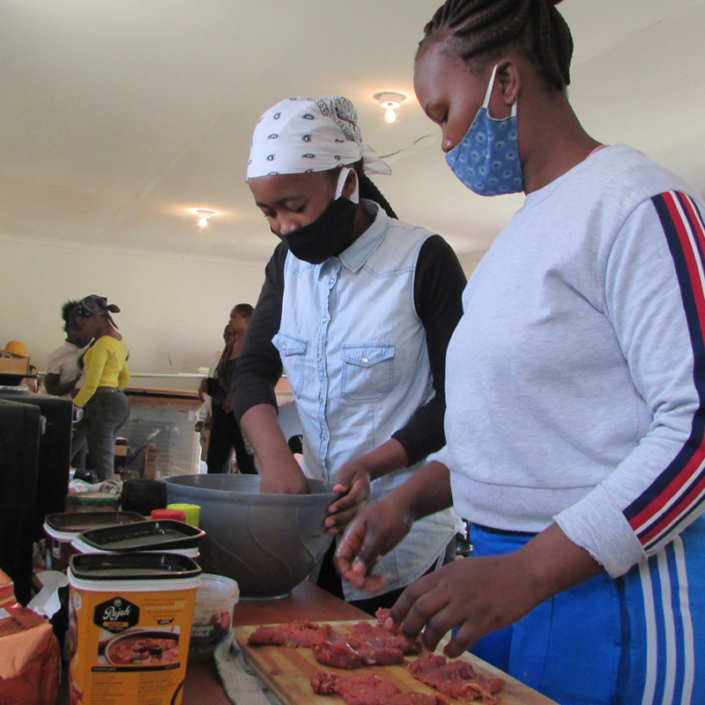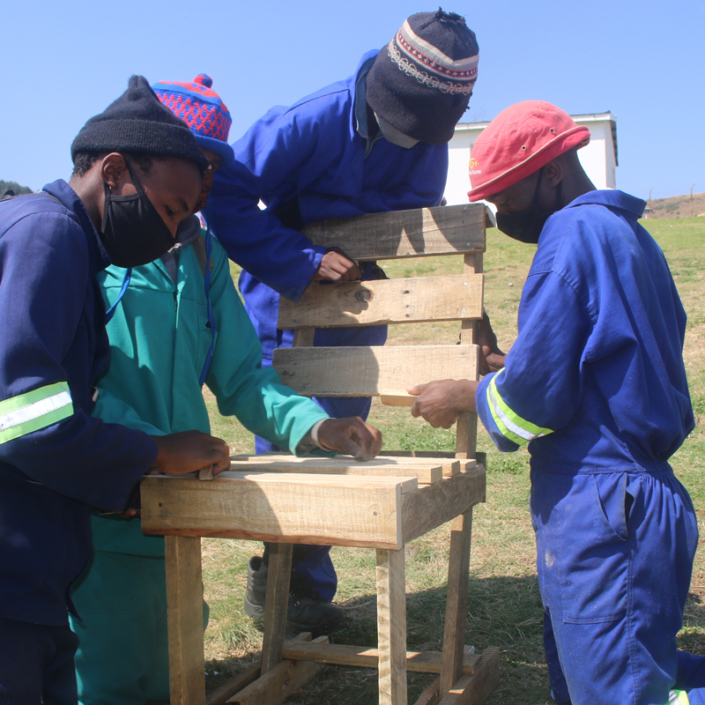Lesotho SOS Children’s Village
SOS Children’s Village / Lesotho
- Lesotho
- Creation of villages
- Acces to schooling
- Professional training
- Boys and girls of various ages
houses each offer a roof to a dozen children
children are currently benefiting of schooling or professional training
types of carrier formations for their future and that of the country
In the far southeast of Lesotho, a small country completely landlocked in the northern territory of South Africa, lies the province of Quthing. It is in this sparsely populated (approx. 124,000 inhabitants, or 43 inhabitants per km2), mainly rural area, with an unemployment rate of 82%, that an SOS Children’s Village has been established. The Hermann Foundation has chosen to take an interest and participate in this program aimed at helping young people to educate themselves (with a strong focus on young girls) to enable them to break out of the cycle of poverty. Their children will thus also have much better chances in their turn.
This village, somewhat modelled on the Pestalozzi Village, has been in existence since 2010 and consists of 12 houses for 9 to 10 children. In each house there is an “SOS mother” who takes care of the children and provides them with a family environment. Each one of them has received a comprehensive training for this demanding task. There is also one such village in the capital (Maseru), where “Tumi” grew up before entering university. An accomplished musician, she has written a song “thank you” that you can watch below to thank SOS Children’s Villages.
“Giving young people a perspective” is the goal of the vocational training project in Quthing. The children, of various ages, all attend school, from elementary school to university or vocational training. Currently, 114 children (69 < 18 years old and 45 > 18 years old) are being taken care of until the end of their education so that they can then take charge of their own lives in a completely autonomous and independent way. These trainings are offered in various fields which are promising for their future and that of the country: construction (with its specializations), computer science, tourism and hotel business, sewing and dressmaking.
The history of Atang
Atang, orphaned at the age of 9, lives with her grandmother 1 hour from Quthing in the mountains. From 2009 to 2016, she lived with an aunt in South Africa, where she attended school. Back in Lesotho, she could not continue her schooling because she did not have the necessary “diplomas/grades” and could not catch up. The South African school years were not recognized. In 2017, she began training as a tailor in Quthing and graduated in 2019. She is also the mother of a little boy. Atang plans to open a sewing business in Quthing and would also like to open a sewing school later. She wants to be independent to earn a living and provide for her family (food, driver’s license for her brother, school fees for her sister), with her grandmother taking care of the little one while she works.
Spring 2021
Many adaptations to the situation due to Covid and the successive lockdowns had to be put in place. It is clear that the SOS structure and its animators have shown creativity and flexibility to best achieve the objectives set.
SOS Children’s Village in Quthing
The pandemic has had a significant impact on the life of the village and its families. Due to the closure of schools, the children had to organize themselves differently. They studied in groups, with the higher grades helping the primary and secondary school children. Thus, in addition to maintaining the learning objectives, it brought the children closer together.
Special activities (art classes, music, drawing, English, etc.) were also introduced. Home-based activities (baking, cooking, sewing, vegetable planting) have also helped to strengthen skills.
Finally, a youth parliament was created in the SOS village of Quthing. Today, this parliament determines the laws of the village and the children and youth are the parliamentary representatives. In this way, everyone has a responsibility and contributes to a positive coexistence.
Vocational training in Quthing
23% of the population is infected with HIV. Many children and young people have lost one or two parents to AIDS and have to manage entire households from a young age. Instead of going to school, many work or beg to survive.
Despite Covid, it is therefore essential to continue to give these young people a perspective by enabling them to acquire basic professional skills in agriculture, construction (including related trades), sewing and tailoring, catering, as well as computer skills, and business management training (mandatory regardless of the course chosen).
More than 700 young people benefit from these short courses and receive a certificate at the end of the program.
December 2021
During our recent meeting, Mr. Malefane, responsible for SOS Children’s Villages in Lesotho, was able to give us good news. In spite of the epidemic, the projects have been able to continue and prepare for future developments almost normally.
The children’s houses are running well, the organization is well established and the constructions are of good quality.
The vocational training of young girls/women is a little more complicated. Indeed, it is still difficult for them to acquire a professional training, and then to exercise their profession, because of the social and family structures which are still not very open to this evolution and because they are expected to participate in the maintenance of the family. Special support is given to problematic and reluctant families.
Mr. Malafane points out another problem, which is recurrent in most of Africa, especially in rural areas. It is the absence of training companies (the theoretical side is easily accessible, but the practical side is more problematic), and then providers of employment.
Quthing (27’000 inhabitants) is therefore not very suitable to offer these opportunities to these young girls/women and outlets other than in the traditional sectors such as hairdressing, sewing or agriculture. Therefore, it made sense to move the vocational training to Leribe (population 450,000) where there are more opportunities for apprenticeship and employment in a much wider range of trades, especially for women.
The entrepreneurial spirit, rather weak as everywhere, can also be better expressed there. Moreover, the government’s will is to support this process so that young people are stimulated to create companies rather than to go abroad to find a job.
This process is still in its infancy, but is promising in the long term, given the seriousness, individual commitment and involvement, especially of young girls/women.
Grace’s testimony
“If I apply myself, I can go far.
Grace, 17, seized her chance. She is one of the few young women who chose to train for the construction trade. At first she had no idea about electrical theory and circuits, but she learned quickly. “I can now make the main wiring for a house and install the connections for lights and outlets, and I can check the voltage,” she reports proudly. She also knows how to protect herself from electrical shock.
Latest news, june 2024
These projects in Lesotho are going well.
In Quthing, all children receive advanced schooling, right through to university.
The relocation of the vocational training project to Leribe has been a success. Opportunities and prospects for young people are much better there. For example, a group of young women trained as electricians subsequently joined forces to form their own company. Participants in the various training courses have also set up their own soccer team, with the aim of breaking down prejudice and promoting women’s abilities, gradually bringing about social change by countering situations of gender discrimination.
Young women from previous batches are also monitored. Some participants in the cooking course have subsequently been awarded a CHF 3,500 scholarship to attend the renowned Dona Balos culinary school.


